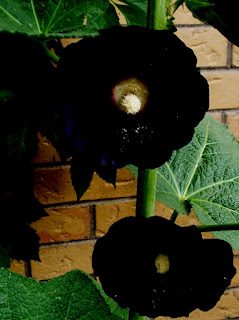
Particularly in Colorado, these three rules are relevant. I learned them the hard way.
I. Become as knowledgeable as possible about your soil type.
a. Is it acid or alkaline
b. Is it organic or mineral
c. Does it contain sand or clay, if clay what kind of clay
d. Is it well drained
For instance: in Colorado my soil is alkaline, mineral and contains both sand and red clay. Because of the low acidity, many nutrients aren’t available to my plants. Iron, for example, exists in abundance, but not in a form my plants can use. I have to administer iron. An indication of iron deficiency in plants is chlorosis – a yellowing of leaves. This can also be caused by too much water. When my Hollyhocks begin to exhibit this, I give them iron in the form of chelates since I know my soil is well drained.
II. Know the insect population, fungus and mold type indigenous to your area.
a. One excellent way of controlling insects is the use of soap and garlic on a weekly basis.
b. Baking soda is very good at retarding certain fungus and molds.
c. There are times when you may have to use a chemical. There are garden pests that are so insidious and so prolific that only a chemical insecticide or fungicide will eliminate the threat. I recommend Bayer’s, All in One, feed and systemic insecticide and fungicide.
III. When you elect to purchase a plant, learn all you can about the plant and where it is best suited to live. Plant it there.
a. Give plants the proper light, whether they are sun or shade lovers.
b. Plant them with similar species, that is to say plant a rose with other flowering plants that like water. The rose is not a xeric plant.
c. When you are planning for a garden or even one plant, try to imagine the amount of space the plant(s) will need when fully grown. Over crowded gardens are often fungi factories, and plants are stressed when forced to compete for water over prolonged periods.
There is nothing worse than a gardening season in which one problem leads to another. Stressed plants are vulnerable. Thus, thirsty plants become victims to other problems. Planning is a gardeners best friend, out West especially.
No comments:
Post a Comment